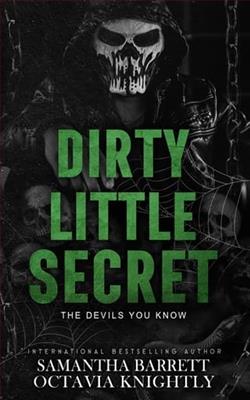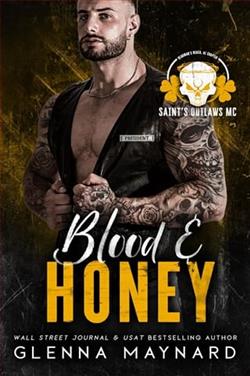Page 84 of Everything She Feared
“Sit with me. I want to talk about the pictures you drew.”
Hesitant, Katie sat as Sara turned the book’s pages.
“Why’re you snooping on me?”
“I wasn’t snooping, honey. I found this when I was picking up your clothes under your bed for the laundry.” Sara turned more pages to the birds, trees, butterflies and hand tracings Katie had made. “I remember these—they’re nice.”
Sara continued to the next pages.
“Why did you put the book under the bed like you were hiding it?”
“It’s private.”
“But you’ve shown me the birds and things you’ve drawn before,” Sara said, turning the page to the stick people. “But not this one, you’ve never shown me this new one.”
Sara blinked as she and Katie looked at Katie’s depiction of the tragedy at the park with two stick people.
The house fell silent.
“Honey, why did you draw this? What does it mean?”
“It’s private. You spied on me.”
Again Katie tried seizing the book from Sara.
“Give it back, it’s mine!”
“Stop.” Sara pulled the book back. “I wasn’t spying on you. But you have to tell me why you drew this.”
“I already told you. I have bad thoughts.”
Sara couldn’t stop now. Jabbing her finger at the sketch, she said: “Katie, I need you to tell me the truth about what happened.”
Katie shook her head, clamping her mouth. Watching her, Sara feared the answer. Maybe because she now believedshe knewthe answer. And all this time, since the day she rushed to Sparrow Song Park, she could never bring herself to say the words. Until now, glimpsing at the sketch, feeling the words rising in her throat, like an eruption she couldn’t control. Sara stabbed at the sketch as if it were the horrible truth.
“Are these your bad dreams, your bad thoughts? Did you—Katie, did you push Anna?”
Katie screamed. “Stop it! Stop, stop, stop!”
Katie blasted from the sofa and thudded up the stairs, slamming her bedroom door, leaving Sara alone on the sofa.
Her skin numbed, the tiny hairs on the back of her neck stood up. Through her tears she stared at her daughter’s notebook—feeling its weight pressing down, its heat burning her.
37
Seattle, Washington
Sipping coffee athis desk, Ryan Gardner scrolled through folders on his computer, stopping at the video of his interview with Cody Barlow, retired sheriff of Tall Tree County, Montana.
Ryan had located Barlow in a mobile home park near Tucson, Arizona, and called. Barlow agreed to talk to him but only in person, so Ryan made his way to Tucson. A few years after he’d recorded the video, Barlow died from colorectal cancer.
But he came to life now on Ryan’s laptop.
Here was white-haired Barlow on a recliner in his double-wide trailer, black-and-blue-plaid Western shirt, black-framed glasses and with a small smile under his gray walrus mustache. Ryan found his gentle, almost high-pitched voice calming.
“You have good sources tracking me down on this, son. Word on the law enforcement grapevine is that you’re a good guy. That, and your personal connection to the whole damn thing, made it an easy decision for me to help you.”
“Thank you. I appreciate it.”















